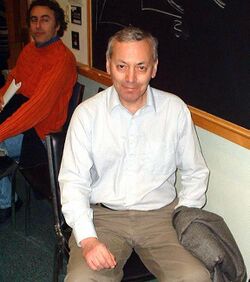Biography:Alexander Vilenkin
Alexander Vilenkin | |
|---|---|
Олександр Віленкін; | |
 Vilenkin at Harvard University, 2005 | |
| Born | May 13, 1949 Kharkiv,[1] Ukrainian SSR, Soviet Union |
| Nationality | American |
| Alma mater | University at Buffalo |
| Known for | Eternal inflation Borde–Guth–Vilenkin theorem Cosmic strings |
| Scientific career | |
| Fields | Physical cosmology |
| Institutions | Tufts University |
Alexander Vilenkin (Russian: Алекса́ндр Виле́нкин; Ukrainian: Олександр Віленкін; born 13 May 1949) is the Leonard Jane Holmes Bernstein Professor of Evolutionary Science and Director of the Institute of Cosmology at Tufts University.[2][3] A theoretical physicist who has been working in the field of cosmology for 25 years, Vilenkin has written over 260 publications.[4]
Biography
As an undergraduate studying physics at the University of Kharkiv, Vilenkin turned down a job offer from the KGB, causing him being blacklisted from pursuing a graduate degree.[5][6] Then he was drafted onto a building brigade and later worked at the state zoo as a night watchman while conducting physics research in his spare time.[5][7]
In 1976, Vilenkin immigrated to the United States as a Jewish refugee,[7] obtaining his Ph.D. at Buffalo. His work has been featured in numerous newspaper and magazine articles in the United States, Europe, Soviet Union, and Japan, and in many popular books.[citation needed]
Work
In 1982, Paul Steinhardt presented the first model of eternal inflation, Vilenkin showed that eternal inflation is generic.[8] Furthermore, working with Arvind Borde and Alan Guth, he developed the Borde–Guth–Vilenkin theorem, showing that a period of inflation must have a beginning and that a period of time must precede it.[9] This represents a problem for the theory of inflation because, without a theory to explain conditions before inflation, it is not possible to determine how likely it is for inflation to have occurred. Evidence exists[clarification needed] to suggest that the probability is very small, resulting in an initial conditions problem.[citation needed]
He also introduced the idea of quantum creation of the universe from a quantum vacuum. Moreover, his work in cosmic strings has been pivotal.[clarification needed][according to whom?]
He was elected a Fellow of the American Physical Society in 1989 "for pioneering research in the application of particle physics to cosmology, and in particular for seminal contributions in the areas of cosmic strings and quantum cosmology". [10]
Books
- Many Worlds in One: The Search for Other Universes (July 2006).
- Cosmic Strings and Other Topological Defects by A. Vilenkin, E. P. S. Shellard, Alexander Vilenkin, and E. Paul S. Shellard (Paperback - Jul 31, 2000)
References
- ↑ American Men and Women of Science, Thompson Gale, 2005.
- ↑ "Alexander Vilenkin". http://cosmos2.phy.tufts.edu/vilenkin.html.
- ↑ "Named Professorships". Tufts University. https://as.tufts.edu/faculty/named-professorships.
- ↑ "Alexander Vilenkin Research References". https://www.researchgate.net/scientific-contributions/6110953_Alexander_Vilenkin.
- ↑ 5.0 5.1 MENCONI, DAVID. "TO FIND HERSELF AS A MUSICIAN, ALINA SIMONE FIRST HAD TO FIND HER RUSSIAN ROOTS ", Tufts Magazine, 2010.
- ↑ Freedman, David H. "The Mediocre Universe", Discover Magazine, 01 February 1996.
- ↑ 7.0 7.1 STOBER, DAN. "Physicist: Universes pop up ad infinitum", Stanford News, 01 April 2009.
- ↑ Vilenkin, Alexander (1983). "Birth of Inflationary Universes". Phys. Rev. D 27 (12): 2848–2855. doi:10.1103/PhysRevD.27.2848. Bibcode: 1983PhRvD..27.2848V. http://journals.aps.org/prd/abstract/10.1103/PhysRevD.27.2848.
- ↑ Borde, Arvind; Guth, Alan; Vilenkin, Alexander (2003). "Inflationary Spacetimes Are Incomplete in Past Directions". Phys. Rev. Lett. 90 (15): 151301. doi:10.1103/PhysRevLett.90.151301. PMID 12732026. Bibcode: 2003PhRvL..90o1301B. http://journals.aps.org/prl/abstract/10.1103/PhysRevLett.90.151301.
- ↑ "APS Fellow Archive". APS. https://www.aps.org/programs/honors/fellowships/archive-all.cfm?initial=&year=1989&unit_id=&institution=.
External links
- Publications of Alexander Vilenkin @ INSPIRE-HEP
- Interview with Tufts cosmologist Alex Vilenkin on his new book, "Many Worlds in One: The Search for Other Universes" on the podcast and public radio interview program ThoughtCast.
- Inflationary spacetimes are not past-complete
- Interview with Vilenkin on "New Books in Astronomy"
- Lecture by Vilenkin on "Proving the Universe Had a Beginning"
